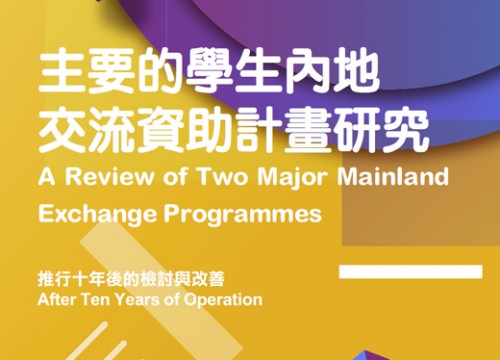Abstract
Mainland Exchange Programme (the “Programme”) has been organized for 10 years by the Education Bureau (“EDB”), the Home Affairs Bureau and other government funding schemes (such as the Quality Education Fund). This study focuses on the Programme and its support measures. Among the many exchange programmes in EDB, the " Mainland Exchange Programme for Junior Secondary and Upper Primary Students "(「同根同心」)and " Mainland Exchange Programme for Secondary School Students " (「同行萬里」)are the most representative programmes with the highest number of participants and the largest funding. This research study will therefore focus on these two projects, and analyze the roles and achievements of EDB on the Programme over the past decade as well as the challenges ahead.
In addition to reviewing government policy papers, the literature review in this research study also includes the tenders and circulars of the Programmen in recent years. Besides, in order to obtain more valid research results, the Hong Kong Policy Research Institute also collected the views from more than 250 teachers through questionnaires from November to December in 2018. This has been the largest teacher poll in the relevant field research in Hong Kong in the past five years.
Major Research Findings
The research findings show that the HKSAR Government (the “Government”) has invested a lot of resources in the development of the Programme in the past decade, and has attained considerable achievements in different aspects, including:
Achievement 1: Effective implementation of the policy and significant increase in the number of participants
The Government invested a large amount of resources in the Programme over the past decade. There was a ten-fold increase on the financial budget from HKD$12 million in the 2008/09 academic year to HKD$120 million in 2019/20 academic year. Under the substantial increase in resources, the Programme successfully attracted more than 400,000
participants in the past ten years, with a growing number of students of different age groups including primary, secondary as well as post-secondary school students. The number of participants increased from approximately 10,000 in 2008-2009 to nearly 70,000 in 2017/18.
In addition to student participants, the number of school participation has also increased significantly, from 302 in 2015/16 to 535 in 2017/18, an increase of over 77% (Tang Wing Lam, 2019). This shows that the popularity of the Programme is getting higher and higher. However, the Programme is mainly managed by the Students Mainland Exchange Programme (SMEP) Section, which has only about 20 staff members. In terms of the scale of the administration, the number of participants is quite ideal.
Achievement 2: Measures after major political events in the society
EDB has taken appropriate measures on the Programme after major political events in Hong Kong. After the “Anti-National Education” demonstration in July 2012, the Moral and National Education curriculum was shelved. The Programme hence played a more important role in enabling students to understand national affairs. Not only the number of participants did not drop significantly after the demonstration, but it reversed the previous decline pattern and showed a "v-shaped" rebound trend. The number of participants rose from 26,000 to 50,000, a rise of nearly 50%. Similar rebound also appeared after the riots in Mong Kok on the Chinese New Year’s Day in February 2016. This shows that the relevant authorities have taken appropriate and effective measures after these events, enabling the Programme to become even more important.
Achievement 3: Seeking common ground while respecting differences, utilizing culture as the starting point and consolidating students' understanding of Chinese culture
There are many differences between Hong Kong and the Mainland in various aspects like policies, development and economic system. However, the Government has skillfully started with culture. Among the current themes of the Programme, most of them are based on Chinese culture, such as the theme “The Birthday of Dr. Sun Yat-sen”. Others include themes based on Chinese architecture and literature. Through the cultural link between Hong Kong and the Mainland, students can understand the cultural similarities
between Hong Kong and the Mainland, and enhance the connection between the two places. On the other hand, the current understanding of Chinese culture in secondary schools is mainly from Chinese literature in Chinese language lesson, Chinese History lesson and other subjects. If a student needs to know about Chinese culture deeply, through acquiring knowledge in disciplines like architecture, festivals, agriculture, and cultural heritage, the Programme is an important extension of the curriculum. They
provide students with an opportunity to learn Chinese culture in person, with a higher authenticity and comprehensiveness than classroom learning. This consolidates students’ roots and sense of belonging to Chinese culture.
Achievement 4: Thematic response to the Mainland’s development
As the Central government has set out successive directions for national development in recent years, the number of themes and locations of the Programme has also increased. For example, a series of thematic exchange learning programs are held from time to time, covering the fields of science and technology, art and nature, which respond to the trend of national development. Moreover, the number of exchange locations has been gradually increasing. At the beginning, the exchange locations are limited
to only Guangdong Province, but now, there are more than 22 locations in many provinces for students to choose from. This would allow students' understanding of China to be more comprehensive.
Achievement 5: Successfully enhance students' individual abilities and expand their horizons on china
In this quantitative study, the teachers interviewed believe that the Programme provided students with an "activity classroom". The personal abilities of the students are enhanced through the exchange programmes, including taking care of themselves, Putonghua language skills, and intercultural communication skills. At the same time, the teachers also believe that by visiting different places in Mainland, students can broaden their horizons. Also, it can allow student to gain the most authentic Chinese experience and let students learn the history of China's development.
The research findings indicate that the Government has high expectations for the Programme. However, owing to the various challenges at different stages, there are questions about the effectiveness of some part of the Programme. This paper summarizes the challenges into three stages chronologically: planning, execution, and review.
Challenge 1: Stage of Planning – Policy Expectations of the Two Governments Need to Be Straightened Out
In the past ten years, the Central Government leaders on several occasions publicly gave their suggestions on the development direction and policies of the Programme. Under the framework of the Constitution and the Basic Law as well as the basis of "One Country, Two Systems", the Government does not have to strictly follow the policies of the Central Government. However, the implementation of Programme, including itinerary arrangements and cooperation, is closely related to the Central Government as well as the relevant departments and institutions in the Mainland. To some extent the Government has already made relevant policies and measures in response to the recommendations of the Central Government, but this research has found that there is a policy gap between the Central Government and the HKSAR Government, and if the policy gap is big, there may be incompatible implementation between the two governments, hence reducing the efficiency and effectiveness of the Programme. Therefore, the HKSAR Government should attempt to straighten out the policy expectations of the two governments and strengthen communication with the Central government, in order to facilitate better cooperation and to increase the effectiveness in programme implementation.
Challenge 2: Stage of Planning – Regular programme content should keep pace with the times and different perspectives should be sought
The themes of the Programme within the last decade have not been extensively updated. In particular, EDB has made relatively few updates with the content of the regular xchange programmes, which may not attract students to participate repeatedly. Although EDB has provided thematic exchange programmes related to the curriculum, student growth and development, they are not regularly held, with participants accounting for less than 10% of the total participants of the Programme. For example, the "Vocational Education Experience Camp" is expected to have only 80 participants annually and hence has limited impact.
Under the influence of globalization, it is very convenient for students to go on foreign exchanges. Hence, comparing to foreign exchange programmes, students' enthusiasm for the Programme is relatively low. At the same time, globalization also facilitates students’ information gathering from the world. Their exchange focus is no longer on scenic spots, hence the traditional Programme model is less attractive to today's students.
The current Programme is mainly based on “tour group” site visits. Concerning the goal of learning China-related issues during the Programme, like “a comprehensive and correct understanding of One Country, Two Systems” and “Shouldering the responsibility for the Great Rejuvenation of the Chinese Nation”, there is a big expectation gap according to the teachers interviewed, i.e., the gap between the actual operation in the Mainland and the original intention of the policy. Students hence cannot understand the
relationship between the Mainland and Hong Kong comprehensively.
Challenge 3: Stage of Execution - Enthusiastic Teachers and Partners are Needed Institutionally
According to the various documents in the briefing sessions held by government officials, there are high expectations for the functionality of teachers in the Programme. In addition to leading the debriefing sections, teachers are expected to act as tour guides. At the same time, the Government has high expectations for the mainland tour leaders and hopes that they can provide a comprehensive introduction. However, the tendering policy for the Programme is based on the principle of "lowest bid wins". The tour fee is not reasonable compared with the market price and the yearto- year comparison. As a result, under the policy of “lowest bid wins”, the contractor would lower the price to win the bid, and would consequently shift the cost-gap to the itinerary planning, which indirectly leads to a decline in the quality of the exchange, thereby affecting stuents’ learning experience. According to this quantitative survey, teachers being interviewed believe that the unsatisfactory experience of the Programme would greatly affect the school’s and students' desire to participate again later on, and would also reduce the enthusiasm of teachers. The current policy of “lowest bid wins” needs to be reviewed.
As the “Mainland Exchange Programme for Junior Secondary and Upper Primary Students " is a “package” one, teachers are often in a passive role, and hence, their initiative and commitment are also relatively low. In the face of a changing society and the introduction of new themes in the Programme, teachers need to adopt new teaching methods. However, the Government has not provided relevant support or training to the teachers, whose performance would not be able to meet the policy expectations.
Challenge 4: Stage of Execution - Extension of sharing sessions among students and enhancing the impact on local schools
The research has found that the Programme is facing three “bottlenecks”, namely, decreasing number of student participants, insufficient sharing among peers, and low effectiveness.
The number of vacancies in the Programme has been increasing year by year. This is mainly because the number of student participants and the expected quotas have not increased in the same rate accordingly. In addition, students may not participate in exchange activities for various reasons; therefore, the sharing of the participants’ learning outcomes with those who did not participate would play an important role in the extension of the experience of participation. Finally, as the itinerary of the Programme
is mainly "tour group" based visit, the real contact with the Mainland is relatively shallow, which greatly reduces the learning experience of the students.
Challenge 5: Stage of Review - A comprehensive review system should be developed to collect feedback from participants
Owing to the lack of a good feedback system, there is a lack of bottomup flexibility in the current exchanges in the Mainland. Participants including the students and the teachers have no relevant channels to reflect their opinions currently. For example, most of the teachers being interviewed in the quantitative research believe that the application procedures for the Programme were too complicated, and the itinerary was too rushed to understand the context deeply. Yet, they are the real users of the Programme. The failure of collecting feedback effectively and the failure for schools to participate in the Programme design hence show that it does not fully meet the needs of the users.
Recommendations
With reference to the three levels of challenges as shown above in this research study, the following recommendations are put forward to improve the Programme system.
Stage of Planning: More impetus should be introduced through finetuning the policy so that an accurate Mainland exchange system could be improved and established
- Adjust and simplify the application process to allocate more time on teaching,
- The HKSAR Government should work with the Central Government to raise the requirements for Hong Kong contractors, tour leaders and tour guides. Moreover, the Central Government is urged to strengthen the regulation of tour guides in the Mainland.
- The Government should provide teachers with training on the knowledge of relevant themes, with content covering tourist guide knowledge, summarization and explanation skills, so that they can fully understand the content of the itinerary and the meaning of the Programme.
- Elements like student personal growth, attitude and social learning may be included in the Programme, or based on the current cultural themed-based exchange model.
Stage of Execution: Diversity enhancement and consolidation to ensure the quality of the Programme
- Detailed explanation session can be arranged during the visit, with a Question and Answer part to consolidate the Programme.
- In the quantitative research, the teachers who have been interviewed believe that new themes like career and values education may be added into the Programme. At the same time, whole-person development should also be included to accommodate students’ needs, including their personal development.
- The Government may form a team of experts according to the theme, and cooperate with EDB to provide guidance and explanation on the Programme.
Stage of Review: Develop a sound and regular feedback system to extend exchange benefits
- The feedback system should not be applied only to the postexchange reviews and there should be consultation before planning and tendering.
- The system should include regular reviews with the collaborating organizations to understand the expectations and gaps from teachers and students on the Programme.
- Promptly reject sub-standard travel arrangements
- The Government should also collect the views of the contractors and the education sector to improve the itinerary of the Programme to suit the needs of the users.
- The Government should allow schools to allocate additional resources and actively use innovative technologies and social media to tackle the “three bottlenecks”.



